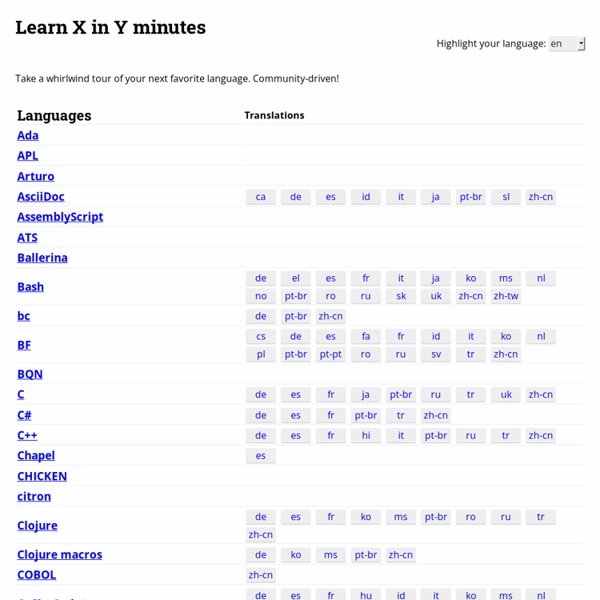



Vamonos: Dynamic algorithm visualization in the browser Vamonos is a library for generating browser-based visualizations of algorithms & data structures. Here are some reasons why we think Vamonos is great: No installation barrier. Visualizations run on any modern browser using standard Javascript. No plugins or extensions are needed. Self-containment.
Getting Started with Ruby on Heroku Introduction This tutorial will have you deploying a Ruby app in minutes. Hang on for a few more minutes to learn how it all works, so you can make the most out of Heroku. The tutorial assumes that you have: a free Heroku accountRuby 2.2.3 installed - see the installation guides for Ruby and Rails on OS X, Windows and LinuxBundler installed - run gem install bundler If you are running on Windows, consider following Getting Started with Ruby on Heroku (Microsoft Windows) instead - it uses a more Windows-friendly local tooling. Inspiration design d'interfaces utilisateurs - Awwwards Elements such as full screen images or videos, parallax scrolling, hamburger menu icons, boostrap templates or "Google Design Material"... are everywhere! The saturation of these techniques and resources has led to a rather boring, generic web experiences. Responsive Web Design created a platform for safe design patterns which safeguard usability and multi-device adaptation. At this point in time, questions are being asked about the over-reliance on patterns and design materials; achieving visually creative and original user experiences appears to be the cause of much head scratching to some within the industry. Despite this rationalization of design, we can find original and creative examples which take the risk and look beyond flat design. The spotlight is hovering towards interaction animation and transition.
Introduction to FP with Haskell Broadly speaking, functional programming is a style of programming in which the primary method of computation is the application of functions to arguments. Among other features, functional languages offer a compact notation for writing programs, powerful abstraction methods for structuring programs, and a simple mathematical basis that supports reasoning about programs. Functional languages represent the leading edge of programming language design, and the primary setting in which new programming concepts are introduced and studied. Techniques de ninja en CSS - CSS Tricks Me, for the last year or so: "rem's are so cool! I'm gonna size everything with them, that way I can adjust the font-size on the root element and everything will scale with it!" It was a nice dream. And it wasn't a disaster. That's what I'm doing right now here on CSS-Tricks and this is how it plays out in a very simple scenario:
Functional Programming Principles in Scala About this course: Functional programming is becoming increasingly widespread in industry. This trend is driven by the adoption of Scala as the main programming language for many applications. Scala fuses functional and object-oriented programming in a practical package. Functional Program Design in Scala About this course: In this course you will learn how to apply the functional programming style in the design of larger applications. You'll get to know important new functional programming concepts, from lazy evaluation to structuring your libraries using monads. We'll work on larger and more involved examples, from state space exploration to random testing to discrete circuit simulators. You’ll also learn some best practices on how to write good Scala code in the real world. Several parts of this course deal with the question how functional programming interacts with mutable state. We will explore the consequences of combining functions and state.
Parallel programming with Scala About this course: With every smartphone and computer now boasting multiple processors, the use of functional ideas to facilitate parallel programming is becoming increasingly widespread. In this course, you'll learn the fundamentals of parallel programming, from task parallelism to data parallelism. In particular, you'll see how many familiar ideas from functional programming map perfectly to to the data parallel paradigm. We'll start the nuts and bolts how to effectively parallelize familiar collections operations, and we'll build up to parallel collections, a production-ready data parallel collections library available in the Scala standard library. Throughout, we'll apply these concepts through several hands-on examples that analyze real-world data, such as popular algorithms like k-means clustering.
Software Testing Methodologies Software Testing How to Make Software Fail Intermediate Approx. 1 month Assumes 6hr/wk (work at your own pace) Join 67,785 Students Programming Languages: Building A Web Browser When does the course begin? This class is self paced. You can begin whenever you like and then follow your own pace. It’s a good idea to set goals for yourself to make sure you stick with the course.
Software Architecture and Design Course Creators and Instructors Overview Software Architecture and Design will provide students with the principles and concepts involved in the analysis and design of large software systems. The learning objectives for the course are the following: Understand and apply object-oriented design techniquesDevelop and evaluate software architecturesSelect and use appropriate architectural stylesSelect and use appropriate software design patternsExpress the specifications and design of an application using UMLSpecify parts of the design using a formal design language (OCL) View the CS 6310 - Software Architecture and Design course syllabus for more detail.
Software Development Process Software Engineering: Concepts and Practice Course Creator and Instructor Course Developer and Teaching Assistant Sarah SpikesCourse Developer, Lead Teaching Assistant Overview This course provides an in-depth study of the process of developing software systems, including the use of software processes in actual product development, techniques used to ensure quality of the software products and maintenance tasks performed as software evolves. Intro to Theoretical CS (Algo Complexity) When does the course begin? This class is self paced. You can begin whenever you like and then follow your own pace. Good Program Design When does the course begin? This class is self paced. You can begin whenever you like and then follow your own pace.